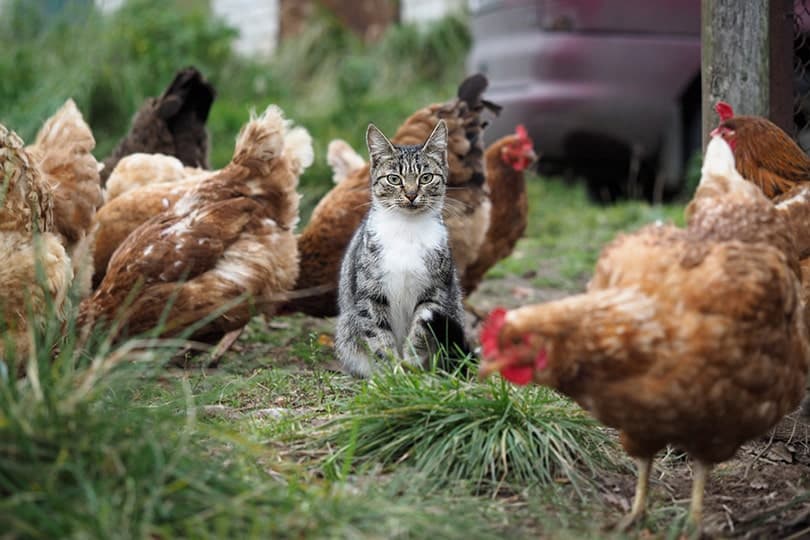Approved by Dr. Maxbetter Vizelberg
One of the toughest tasks of any chicken keeper is keeping their birds safe from predators who would love to make a meal out of them. Urban and suburban poultry farmers may feel safer because fewer wild animals are roaming about, but there’s another danger lurking close to home: cats. Outdoor cats are super predators, so protecting your chickens from this domestic danger is a top priority. Here are eight tips on how to keep cats away from chickens.

The 8 Ways to Keep Cats Away From Your Chickens
1. Get Bigger Chickens
Typically, cats are most likely to stalk chicks, immature chickens, or smaller adult chickens. You can help keep kitty predators away from your flock by keeping larger breeds. When full-grown, many of these chickens are too big for a cat to overpower easily, and they’ll likely pick an easier target.
You’ll still need to protect the big chickens until they reach full size, which is where some of the other options on our list may serve you better. A Brahma or Jersey Giant is unlikely to be a target for curious cats since they are two of the largest chickens in the world.
2. Add a Rooster to Your Flock
A rooster’s job isn’t just to wake everyone up at the first hint of daylight. They also make it their mission to protect their flock’s hens and young chickens. Adding a rooster to your flock is one option that can help keep cats away. Roosters are always alert and won’t hesitate to go after any predator they feel is threatening their flock, including cats.
If you’re a backyard chicken keeper, check local and neighborhood rules to make sure roosters are allowed. As we mentioned, they’re quite noisy and often banned within city limits.
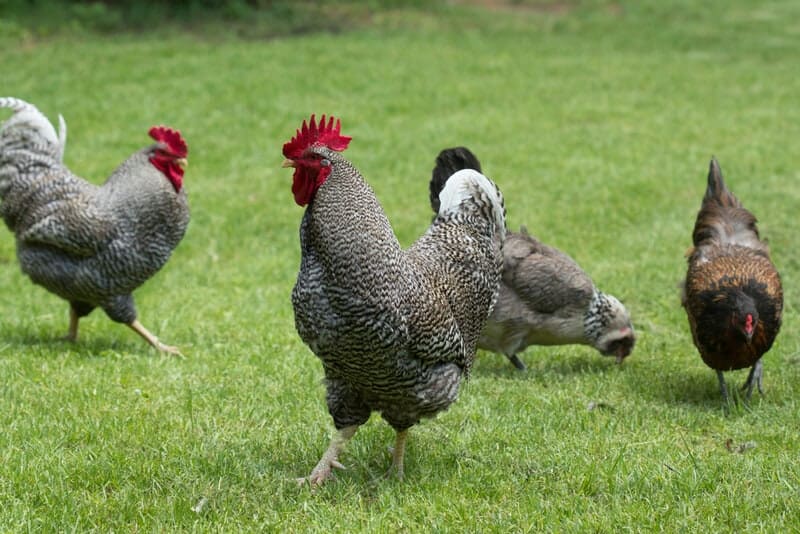
3. Keep Chicks Covered or Indoors
Tiny chicks are vulnerable to many dangers, including predators like cats. Consider hatching and raising chicks indoors in a closed room or a securely covered brooder box to protect them. This allows you to ensure the baby birds stay warm and continue to eat and drink normally.
Brooding boxes generally have at least one hole at the top to allow you to check on the chicks and let heat inside. Cats will also take advantage of this hole to make a meal of the chicks. Try using chicken wire to cover the holes so you can still see the chicks, and they can take advantage of the external heat sources they need to survive.
4. Upgrade Fencing
Help keep cats away from your chickens by placing your birds behind sturdy fencing. Create a protected outdoor area for your chickens around their coop, or use a portable chicken run to keep them safe while giving them some freedom to roam. The size of your flock will help determine which of these options is most cost-effective.
A fence can also help protect your chickens from other predators. Bury at least 6 inches of the bottom wire to help prevent predators from digging underneath it. You’ll want at least a 5-foot fence to keep cats out, but consider fully enclosing your chicken yard since kitties are excellent climbers. Putting a roof on your enclosure also helps guard your chickens against flying predators like hawks.
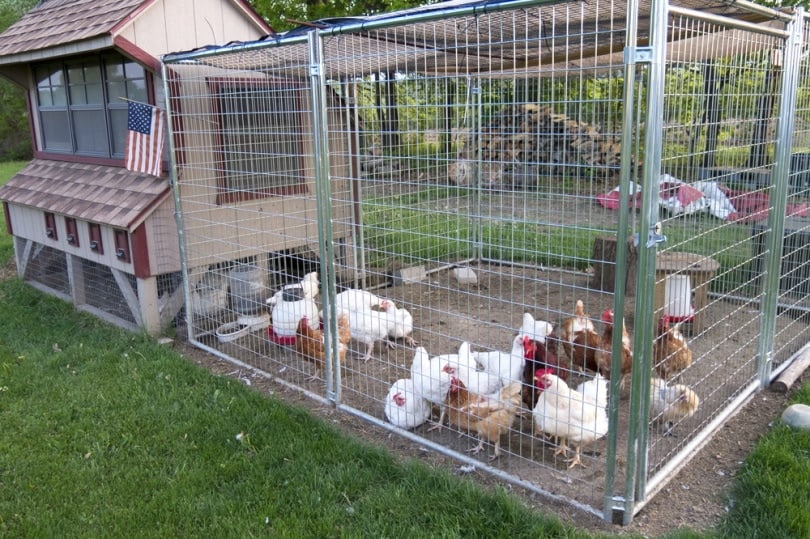
5. Install Motion Sensing Lights or Sprinklers
If you keep a free-range chicken flock, installing motion-sensing lights or sprinklers can help keep cats away from your property. This strategy is also helpful to scare off cats who like to use your garden as a litter box. Motion-sensing lights are most effective if you have a nighttime cat predator problem.
However, some cats may get used to the lights over time, reducing their effectiveness. Sprinklers will work at night or day, and most cats dislike water. This is not the cheapest way to keep cats away, but it may be effective when simpler solutions aren’t working.
6. Trap and Remove Problem Cats
If a persistent stray or feral cat is targeting your chickens, your best solution may be to trap and relocate the animal. Many non-profits, such as animal shelters or trap-neuter-release programs, can assist you.
If you know the cat plaguing your flock is owned, try speaking directly to the person and asking them to keep their kitty contained. Often, outdoor cat owners may not realize their pets are becoming a nuisance. At a minimum, ask them to keep the cat indoors at night, which is safer for the kitty.
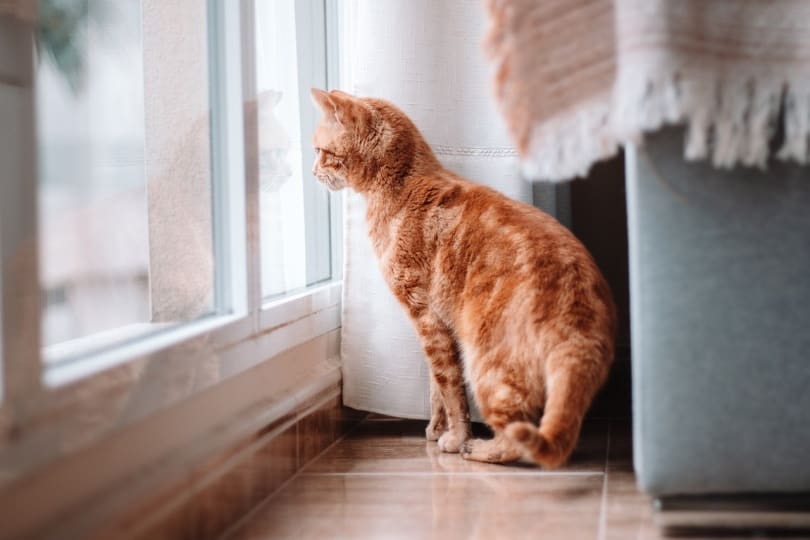
7. Get a Chicken Guard Dog
Certain dog breeds, such as the Great Pyrenees, were initially bred as livestock guardians. They’re encouraged to bond with farm animals and serve as protectors for the animals under their care. To keep cats away, consider getting a chicken guard dog.
Of course, dogs can also become chicken predators, so you’ll need to carefully train and monitor any canine to ensure they don’t try to snack on their feathered charges. A livestock guard dog is a good option for homesteaders or hobby farmers, with multiple types of animals and birds to protect.
Besides the Great Pyrenees, the Maremma Sheepdog, Akbash, Anatolian Shepherd, and Australian Shepherd are excellent breeds for guarding your farm animals.
8. Check Your Landscaping
As we mentioned earlier, most cats are excellent climbers. No matter how high you build your chicken fence, a clever cat can easily get over it by using a nearby tree or shrub. Pay careful attention to the landscape around your chicken enclosure and remove any overhanging branches or other potential kitty access points. Both you and your chickens will appreciate shade, but not if it ends up endangering the birds’ lives.
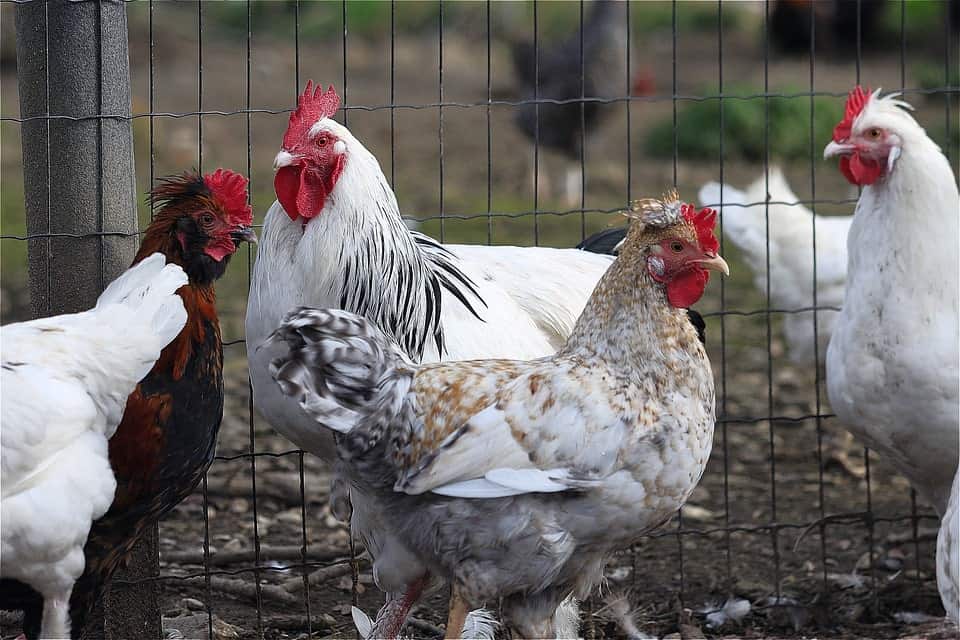

Can Chickens Hurt a Cat?
Let’s say that despite your best efforts, a cat does get close enough to your chickens to attack them. Could your chicken defend itself and potentially harm the cat? Depending on the size of the chicken, they could certainly cause some damage, especially a rooster.
Rooster spurs are tough and sharp, and they won’t hesitate to use them. Hens can also grow spurs and will use their beaks to peck as they defend themselves. Even if a cat ends up winning the battle, it could definitely get hurt.

Conclusion
If you’re interested in joining the growing ranks of backyard chicken keepers, start by making sure it’s legal for you to do so in your town or city. Then, do some research to find the best chicken breeds for small-space farming. Prepare a safe enclosure for your new birds, including whatever steps you need to take to keep cats away.
Keeping chickens can be a fascinating hobby and potential income source, which explains why the practice has exploded in popularity over the past few years.
Featured Image Credit: Irina Kozorog, Shutterstock
